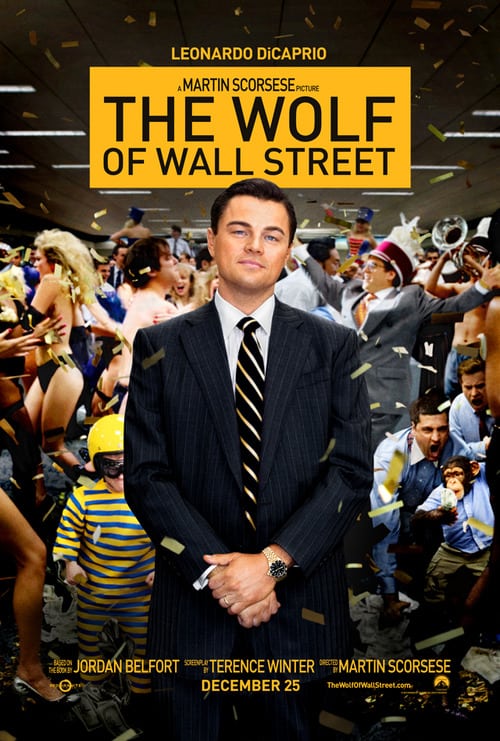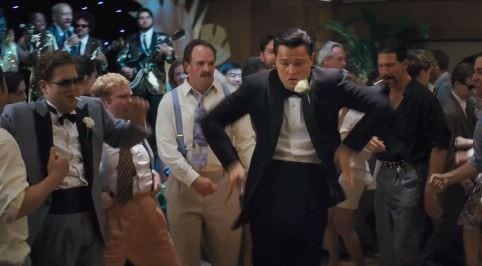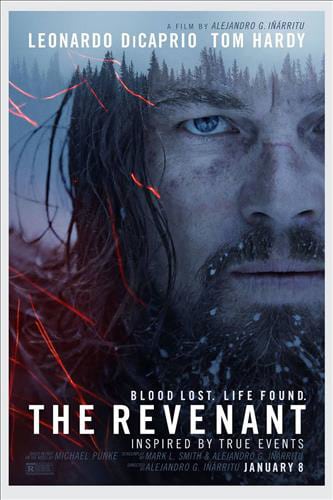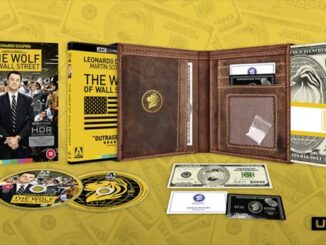The Wolf of Wall Street
Directed by: Martin Scorsese
Written by: Jordan Belfort, Terence Winter
Starring: Jonah Hill, Leonardo DiCaprio, Margot Robbie, Matthew McConaughey
USA
IN CINEMAS NOW
RUNNING TIME: 180 min
REVIEWED BY: Dr Lenera, Official HCF Critic
In 1987, Jordan Belfort takes a stockbroker job at an established Wall Street firm. His boss advises him that the way to succeed is to forget the idea that the client should get some money from a sale, and to adopt a lifestyle of sex and cocaine. The firm fails after Black Monday, and Jordan finds himself out of work. His wife pushes him to take a job with a Long Island boiler room which deals in penny stocks. His aggressive pitching style soon earns him a small fortune. He befriends Donnie Azoff, a salesman who lives in the same apartment complex as him, and, recruiting several of Jordan’s friends, some of them experienced marijuana dealers, and his accountant parents, they form Stratton Oakmont. Despite the respectable name, it’s essentially a pump and dump scam, where the workers swindle money out of people by selling them rubbish. An exposé in Forbes dubs Jordan the “Wolf of Wall Street”, and soon hundreds of ambitious young financiers flock to his company and its debauched antics…..
569 utterances of the ‘F’ word. That’s a hell of a lot, and it’s easy to see why there has been much publicity about the fact that Martin Scorsese’s latest film contains such a high number, to the point that it now holds the record for the number of times the word has been used in a feature film [for the record, Summer Of Sam, Nil By Mouth and Scorsese’s Casino are second, third and fourth]. I’m the kind of person who thinks one ‘F’ bomb can be more powerful than twenty and really dislikes the increasing use of foul language in society, especially by the young, so I went into The Wolf Of Wall Street with some trepidation. Actually, while there are many scenes where the ‘F’ word is thrown about, it’s usually restricted in large mentions to those particular scenes, and while its use in those scenes comes across as puerile and a whole load of macho, testosterone crap, that’s exactly the point. The stockbrokers in the film may be essentially thieves in that they swindle huge amounts of money off people, and therefore reprehensible criminals as bad as the gangsters that more commonly populate the films of Scorsese, but they’re also little more than children, discovering they have a huge playground and can do what they like.
Talking of gangsters, there’s no doubt that Scorsese is deliberately echoing his great Goodfellas and Casino [which in some respects is a better and more interesting movie] with The Wolf Of Wall Street, not just with its supposed cautionary rags to riches tale of a crook but its structure and many of its devices. The ‘hero’ Jordan Belfont not only narrates parts of the film but tells us that he always wanted to get rich. Therefore there is both a certain predictability and a certain familiarity about this picture, but if it works then why not do it again, and there is no doubt that The Wolf Of Wall Street continues the really strong run of Scorsese films that began with Shutter Island and Hugo [I feel he was rather more hit and miss for quite a while before that and even his hits missed the mark a bit], even I still don’t think it reaches the heights of his early masterpieces. For a start, while its three hours keep on moving, with Thelma Schoonmaker doing her usual fantastic job of editing, the film is sometimes very repetitive – I mean how many times do you need to see Jordan and his cohorts indulging in their Bacchanalian excesses? There have been accusations, and this is nothing new for a Scorsese picture, that the film is glorifying the hedonistic lifestyle it depicts. I’m not sure that’s the case, and in any case to show this kind of thing a responsible filmmaker should show the attraction of it and how people can get caught up in it. The problem is that there’s just too much of it, and I’m not saying that to be prudish: in fact, while there’s all sorts of debauchery going on, most of it is only briefly shown. I’m saying it because it got a little boring.
The opening cleverly goes from what seems like an advertisement for the Stratton Oakmont company, an advertisement which makes out the company to be really nice and caring and wanting to help people, to a party in the office where they are dwarf-throwing, and to Jordan, in what is a typical evening for him, snorting cocaine from a hooker’s vagina. Jordan not only narrates but breaks the fourth wall in actually talking to the audience about his life, and right away Leonardo DiCaprio is incredibly charismatic in the title role. Jordan Belfont was of course a real person, whose memoirs the film is based on, and Leo doesn’t look much like him, but he does give the impression that he could sell ice to Eskimos. More disturbingly, he helps make you often admire him even while you hate what he’s getting up to and his seemingly total lack of a moral compass. This is the closest he’s come in a Scorsese role to the iconic roles that Robert De Niro played for the director, especially in Taxi Driver and Raging Bull. There’s a superb early scene where his boss Mark Hanna, played by Matthew MccConaughey in a great little role, takes Jordan to a fancy restaurant and, in a few minutes, verbally sucks the impressionable, ambitious Jordan into the morally bankrupt, greedy and callous life he will go on to lead. Jordan never seems to care about all the people he swindles, but more to the point I don’t think he even gives the effect of his ‘deals’ much thought. He just wants to get rich, and gets trapped in the life that comes with it.
The film gets less interesting as we are shown time and time again the naughty stuff our protagonists get up to, though some of it is amusing. This is the sort of film where a character can come home and find a gay orgy going on in his living room, though as I’ve said before it’s mostly very brief. Some of this material had to be cut to gain an American ‘R’ rating and, as with Casino, which British cinemas got in a version with extra violence that had been cut by the US censors [though the second DVD release is of the cut US version], the UK version is the full one, though to be honest I can’t think of anything that the MPAA would have cut out. There’s also a hell of a lot of substance abuse, which leads to what is the best drug scene in a film since Human Traffic or even Fear And Loathing in Las Vegas. Jordan has taken a load of out-of-date Quaaludes because the first one didn’t seem to work, and, collapsing onto the floor, has to get out of some hotel doors, down some steps and into his car while being totally unable to stand up. It’s totally convincing and very funny in a dark way: I mean I almost laughed out loud, but he also looked like he was having a stroke. DiCaprio exhibits a flair for physical comedy akin to that in the silent days. The whole film is comedic throughout, and there are definitely some good funny scenes, like a wonderfully politically incorrect conversation of dwarf-throwing, though some of it is just crude without actually being funny, as is the fashion these days.
The Wolf Of Wall Street is Paramount’s first film to be released entirely digitally, and it really does seem that the days of 33mm film are numbered, with Paramount releasing films solely in this format from now on. Scorsese still shot most of it on 35mm, and his direction is as fresh and vibrant as ever, if not quite as showy as his last two films. Different lenses seem to be used throughout to show when Jordan is ‘with it’ or not. Some of the best scenes are actually just ones of dialogue, like when the FBI agent on Jordan’s case pays Jordan a visit and the two play a verbal game of cat and mouse, each person letting the other one know what he’s thinking while often saying words to the contrary. It shows brilliant acting by DiCaprio and Kyle Chandler and superb writing by Terence Winter. Sadly there isn’t enough tension in the latter stages of the film when it all comes crumbling down for Jordan, though the biggest failing of the screenplay is that it doesn’t give enough context to what the Wolf and his pack do. Showing some of the effects of their swindling and fraud would really have helped, but Winter and Scorsese would rather show lots of topless hookers. Maybe they did get a little caught up in the attraction of what they are portraying?
Typically for a Scorsese film, there are quite a few references to other films, if not nearly as many as usual. I’ve seen a couple having sex being disturbed by a yapping dog too many times, but I loved, for instance, seeing the same couple having sex on a bed full of dollar bills like in Diabolik. There aren’t as many songs from the period as one might expect, though Scorsese still uses pop music very well and the soundtrack would make for a fun and diverse listen. Overall, there is a slight emptiness at the centre of The Wolf Of Wall Street, perhaps partly because of the commercial disappointment of his wonderful Hugo, a film which into which he poured his heart and soul. It’s immense fun though, as long as you don’t mind an inordinate amount of boobs and marching powder, and even Jonah Hill is good in it. Old Marty has still got it.











If a stockbroker like Belfort can turn into someone like that, I wonder how many politicians has lives like this.